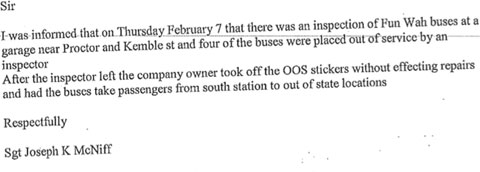Everyone knew – and safety records confirm – that the budget buses were unsafe. So what took regulators so long to step in?
By SHAWN MUSGRAVE | March 20, 2013
When federal transportation regulators declared Fung Wah buses a safety hazard on Feb. 25, no one who had ever taken the budget carrier could have been shocked in the least. Long infamous for erratic driving, frequent breakdowns, and spectacular accidents, Fung Wah attracted the cash-strapped traveler looking for a $15 ticket to Manhattan and a harrowing tale to tell upon arrival.As songwriter Marc Philippe Eskenazi summed it up for TheNew Yorker after the shutdown: "Farewell, Fung Wah/I'll think of you always with nostalgia and fear/[...]/Your engines may be crazy but they still got me here."
Hundreds of pages of newly-uncovered inspection records and internal emails reveal an even bleaker picture of Fung Wah's bus fleet than Boston's New York-bound hipsters ever knew. The damage was so extensive that, after looking up Fung Wah's skirts, one mechanic noted in horror that "it looks like the bus is breaking in half."
But the Fung Wah shutdown says just as much about regulators as the company itself or the riders who kept it in business. Even after citations by the fistful, some for repeated critical damage and operating in defiance of regulators' orders, Fung Wah buses continued to run out of South Station.
Inspection records and internal emails show that regulators failed to take action against the Fung Wah fleet for months despite a clear pattern of critical safety violations and the company's penchant for flouting inspections. By their own indicators, Fung Wah was a hazard to its passengers and other motorists long before February. The agencies charged with keeping riders safe have few answers for what took them so long to intervene.
CRACKED IN HALF
While its riders joked about the lovably dilapidated Fung Wah even as they piled into its buses in droves, few could have known the full extent of its disrepair. Cracked and rotted frames on a third of its vehicles eventually prompted inspectors to shut down all Fung Wah routes until the full fleet could be certified as road-worthy.
Since Fung Wah operates across state lines, Massachusetts safety agencies needed federal action to stop the company. The state Department of Public Utilities (DPU) set that process in motion on Feb. 11 with an email to the Federal Motor Carrier Safety Administration (FMCSA), whose sole mission is to reduce bus and truck crashes on the nation's highways. The DPU email outlined an incident between Fung Wah and Boston police that had taken place four days before. On Feb. 7, Boston Police Department fined Fung Wah $2,000 for continuing to operate three buses that had been ordered off the road by state inspectors after serious cracks were found in their frames.

>> Hundreds of pages of newly-uncovered inspection records reveal an even bleaker picture of Fung Wah’s bus fleet than Boston’s New York-bound hipsters ever knew. Click here to read the documents <<
|
According to an email from BPD, the ticketed Fung Wah manager took the violation stickers off as soon as the inspector left the lot and "had the buses take passengers from South Station to out-of-state locations." When the vehicles were inspected again on Feb. 13, each bus had clocked between 1300 and 1800 additional miles on their odometers. The Boston-Manhattan trip being around 250 miles each way, that suggests these vehicles made the round-trip journey three times each, between them ferrying as many as 1000 passengers from Boston to New York and back after the condemnation.
 Topics
Topics:
News Features
, Manhattan, The New Yorker, bus, More  , Manhattan, The New Yorker, bus, Fung Wah, Less
, Manhattan, The New Yorker, bus, Fung Wah, Less 